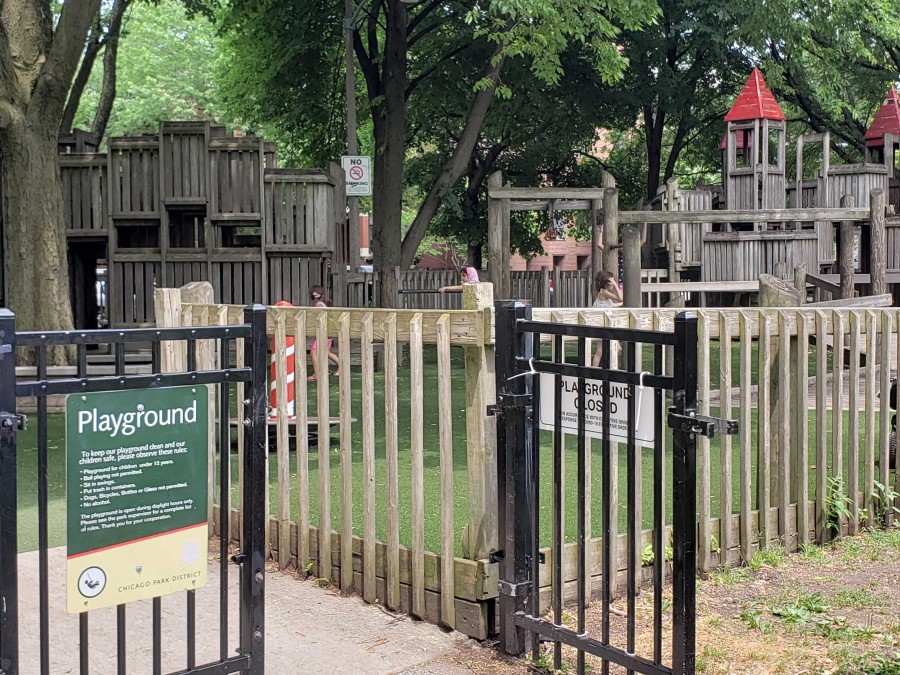If Parks Are Open, Why Aren’t The Playgrounds?
One Curious Citizen heard the risk of COVID-19 transmission is low outdoors — yet the city is keeping its more than 600 playgrounds closed.
By Monica Eng

If Parks Are Open, Why Aren’t The Playgrounds?
One Curious Citizen heard the risk of COVID-19 transmission is low outdoors — yet the city is keeping its more than 600 playgrounds closed.
By Monica EngAs the Lakefront Trail, field houses and other parts of Chicago parks continue to reopen, local playgrounds remain closed.
But you might not know this if you’ve visited a park in recent weeks, where kids are playing on the slides, swings and seesaws.
Jeremy Hornik said his 6-year-old son would like to join them.
“When we go out to the park he often wants to go play on the playground, and I tell him no,” he said.
Jeremy said he’s heard that the risk of transmission of COVID-19 is lower outdoors, so he asked Curious City why playgrounds are still closed when other outdoor activities have opened up and whether there are plans to reopen them anytime soon.
Mayor Lori Lightfoot addressed that last question at a Monday press conference, stressing that parents should not take their children to the city’s playgrounds.
“The playgrounds are still closed and they’re going to be closed for the foreseeable future,” she said.

Chicago Public Health Commissioner Dr. Allison Arwady said playgrounds are “impossible” for social distancing, and she worries about kids mingling. “You think about young children and the ability to keep 6-foot distance on a playground, it really is nonexistent,” Arwady said.
Dr. Tina Tan, a pediatric infectious disease specialist at Northwestern University’s Feinberg School of Medicine, supports the city’s decision. Alongside concerns about the difficulties of keeping kids apart, kids tend to touch their faces often and don’t like to wear masks.
“Most kids under six are not going to wear that mask,” said Tan. “It is just very hard for them to keep it on. It’s hard for a lot of adults and even harder for these younger kids who might wear it for five seconds and then take it off.”
And health officials say playgrounds are places where large groups of people tend to congregate.
On a conference call with reporters, Arwady said the city will continue to monitor the situation, but noted that Chicago still has a lot of COVID-19 cases.
“We’re thinking about the fall as well, and we’re thinking about school and the opportunity to be able to be bringing children hopefully together in ways that are safe,” said Arwady. “And I don’t want to jeopardize some of those larger conversations.”
And even though the CDC says “the primary and most important mode of transmission of COVID-19 is through close person-to person contact,” surface transmission is still a consideration — which is why the Chicago Parks District website urges parents to “keep children away from equipment to prevent the spread of the virus.”
While some smaller towns have the resources to clean playgrounds frequently, Chicago has over 600 playgrounds throughout the city. Chicago Parks District CEO Mike Kelly says this makes the regular disinfection of playground equipment “just impossible.”
So how do you explain to children why they should stay out of playgrounds while other kids are playing away?
“Depending on the age of the child you can basically explain that you don’t want them to get sick,” said Tan. “And that it’s possible that one of the children or parents on the playground is sick and you don’t want to expose them to the virus.”
Monica Eng is a WBEZ reporter. Contact her at meng@wbez.org.
